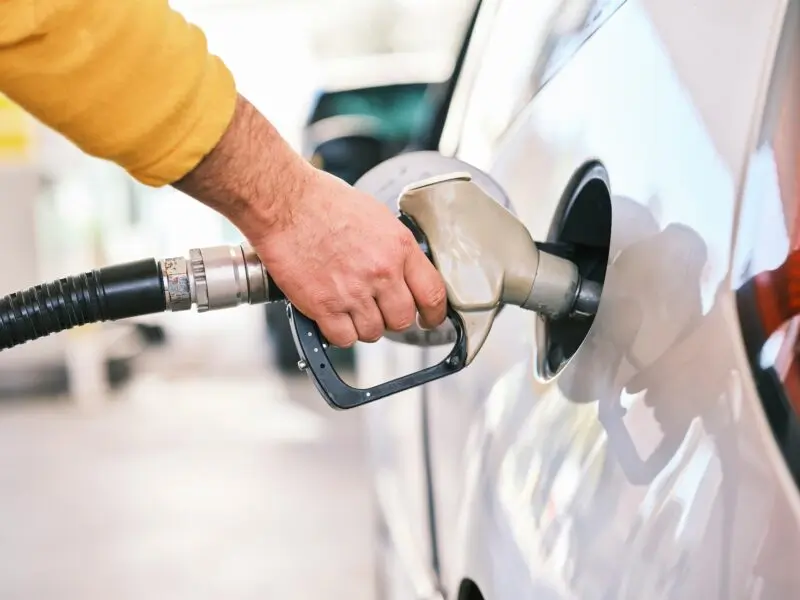Question: How many miles can you drive on one gallon of gas?
Answer: The number of miles you can drive on a gallon of gas depends on various factors, including the type of vehicle you drive, your driving habits, and how well you maintain your car. Additionally, the rise of hybrid and electric vehicles adds another layer to understanding fuel efficiency. Assuming you are driving a gas powered vehicle (non-hybrid) you can usually get anywhere from 15 to 35 miles per gallon.
Given that vehicle type and engine size are the two most important factors when determining a vehicle’s miles per gallon (MPG), it’s better to ask, specifically, what’s the number of miles for a gallon of gas in your car. To figure this out, you have several options, but the simplest is to check your owner’s manual.
Average MPG for different types of vehicles
If you don’t have an owner’s manual, or you’re just curious, we’ve simplified matters by gathering the average MPG for major vehicle categories.
| Vehicle type | EPA average MPG |
|---|---|
| Compact cars | 25 to 35 MPG |
| Sedans and midsize cars | 20 to 30 MPG (50+ MPG Hybrid) |
| SUVs and trucks | 15 to 20 MPG (39+ MPG Hybrid) |
Electric Vehicles: While EVs do not use gasoline, their efficiency is often measured in miles per gallon of gasoline equivalent (MPGe). For example, the Tesla Model 3 offers an impressive range with an MPGe rating of over 120.
Factors influencing miles per gallon (MPG)
Vehicle type and engine size: Compact cars generally offer higher MPG compared to SUVs and trucks due to their smaller engines and lighter weight. Engine technology, such as turbocharging and hybrid systems, also impacts MPG by improving combustion efficiency and reducing fuel consumption.
Hybrid vehicles, which combine a gasoline engine with an electric motor, can significantly increase MPG by utilizing electric power during low-speed driving and coasting.
Driving habits: Aggressive driving, characterized by rapid acceleration and hard braking, can significantly lower MPG. Maintaining a steady speed, accelerating gently, and anticipating stops can help improve fuel efficiency.
Electric vehicles (EVs), although not reliant on gasoline, also benefit from smooth and consistent driving to maximize their range.
Maintenance: Properly inflated tires, well-aligned wheels, and regular oil changes can enhance MPG. Neglecting maintenance can lead to decreased fuel efficiency and higher operating costs.
For hybrids and EVs, maintaining the battery system and ensuring the electric motor components are in good condition is crucial for optimal performance.
How to maximize your car’s MPG
Your car’s fuel efficiency numbers are estimates based on optimal driving conditions. That means there are always ways to improve them. Here are some tips to help you get the most mileage out of every gallon:
Adopt conservative driving habits:
- Maintain a steady speed and use cruise control on highways
- Avoid excessive idling and turn off the engine when stationary
- Reduce speed to increase fuel efficiency
Keep up with regular vehicle maintenance:
- Keep tires properly inflated according to manufacturer’s specifications
- Replace air filters regularly
- Use the recommended grade of motor oil
Tips to improve efficiency in hybrids and EVS
To maximize efficiency in hybrids and EVs, optimize the use of electric power with regenerative braking and charge your vehicle during off-peak hours to benefit from lower electricity rates. Regularly check and maintain the battery system to ensure longevity and consistent performance.

Sarah Gray is an insurance writer with nearly a decade of experience in publishing and writing. Sarah specializes in writing articles that educate car owners and buyers on the full scope of car ownership—from shopping for and buying a new car to scrapping one that’s breathed its last and everything in between. Sarah has authored over 1,500 articles for Jerry on topics ranging from first-time buyer programs to how to get a salvage title for a totaled car. Prior to Jerry, Sarah was a full-time professor of English literature and composition with multiple academic writing publications.

Kevin Berry is the Senior Director of Content at Jerry and has been working in the digital content space since 2011 across the car insurance/repair, personal finance, travel and sports industries. Prior to Jerry, Kevin was a content team lead at NerdWallet overseeing the Multimedia Production and Travel Rewards teams. Previously, he worked for NBC Sports, Comcast Cable and Nike. He has a Master`s Degree from Arkansas State and a Bachelor`s from Oregon State University.







